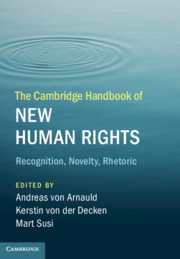Book contents
- The Cambridge Handbook of New Human Rights
- The Cambridge Handbook of New Human Rights
- Copyright page
- Contents
- Figures
- Contributors
- Acknowledgements
- Introduction
- Part I Cross-Cutting Observations
- Part II Public Good Rights
- Part III Status Rights
- Part IV New Technology Rights
- Part V Autonomy and Integrity Rights
- Part VI Governance Rights
- Index
Introduction
Published online by Cambridge University Press: 04 January 2020
- The Cambridge Handbook of New Human Rights
- The Cambridge Handbook of New Human Rights
- Copyright page
- Contents
- Figures
- Contributors
- Acknowledgements
- Introduction
- Part I Cross-Cutting Observations
- Part II Public Good Rights
- Part III Status Rights
- Part IV New Technology Rights
- Part V Autonomy and Integrity Rights
- Part VI Governance Rights
- Index
Summary
This is not a handbook in the traditional sense. Our aim is not to map the field of ‘new’ human rights in the sense that we cover all or even the most important ‘new’ rights under discussion. Rather, we aim at an analysis of unresolved issues surrounding ‘new’ human rights. That debate was kicked off with Philip Alston’s seminal article on ‘quality control’ for ‘new’ human rights published in the American Journal of International Law of 1984. While the topic has since received academic attention for over three decades, it has only ever been treated directly in fairly short journal articles, or in rather cursory remarks in book-length treatises. Legal theory tends to focus on the human rights project as a whole and to leave the development of individual rights aside. Monographs on individual ‘new’ rights, on the other hand, usually take up their development and novelty in passing – but whether one is dealing with a much-discussed right, such as the right to water, or a less-examined right, such as the right to gestational surrogacy, the focus is on their substantive problems rather than the temporal rhetoric surrounding them. By bringing together a large number of ‘new’ rights, looking at them explicitly through the temporal lens and combining the analyses with theoretical approaches in the cross-cutting introductory chapters, we hope to fill these lacunae in current research. In attempting to map these structural questions as comprehensively as is feasible, this volume then really is a handbook.
- Type
- Chapter
- Information
- The Cambridge Handbook of New Human RightsRecognition, Novelty, Rhetoric, pp. 1 - 4Publisher: Cambridge University PressPrint publication year: 2020

